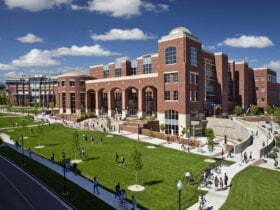Netta Engelhardt studies gravitational factors of quantum gravity, emphasizing string theory. She seems into the thermodynamic behavior of black holes and the idea that singularities are continually hidden in the back of event horizons. Engelhardt joins the Department of Physics as an assistant professor. Engelhardt’s BS is in physics and arithmetic from Brandeis University, and she obtained her Ph.D. in physics from the University of California at Santa Barbara. Previously, she joined the Princeton Gravity Initiative at Princeton University. Engelhardt is affiliated with the MIT Center for Theoretical Physics and the Laboratory for Nuclear Science.
Evelina Fedorenko investigates how our brains method language. She has advanced novel analytic approaches for practical magnetic resonance imaging (fMRI) and different brain imaging strategies to help answer how the language processing community functions and how it relates to other networks within the brain. She works with both neurotypical individuals and individuals with mental problems. Fedorenko joins the Department of Brain and Cognitive Sciences as an assistant professor.
She obtained her BA from Harvard University in linguistics and psychology and finished her doctoral research at MIT in 2007. After graduating from MIT, Fedorenko worked as a postdoc and a studies scientist at the McGovern Institute for Brain Research. In 2014, she joined the Massachusetts General Hospital and Harvard Medical School college, where she was an associate researcher and an assistant professor, respectively. She is likewise a member of the McGovern Institute.

Erin Kara researches black holes. She looks into their formation and how they develop and affect the environments around them, mainly to occasion horizons. To do this, she employs X-ray spectral timing observations. Kara is welcome to use the Department of Physics as an assistant professor. Kara joins MIT from the University of Maryland and the NASA Goddard Space Flight Center. She turned into a Hubble Postdoctoral Fellow and a Joint Space-Science Institute Fellow. She obtained her undergraduate degree from Barnard College in 2011, an MPhil in astrophysics, and a Ph.D. in astronomy from Cambridge University. She is also an MIT Kavli Institute for Astrophysics and Space Research member.
Pulin Li is a developmental and synthetic biologist. Her work aims to cause methods that might permit the programming of cells that could produce tissues and cells in regenerative remedy. She and her lab organization accomplish this by using bioengineering tools, making quantitative measurements of genetic circuits in natural structures, and invoking mathematical modeling. Li is joining the MIT community as an assistant professor in the Department of Biology. Her bachelor’s diploma was received at Peking University, and she finished a Ph.D. in chemical biology at Harvard University. Before her appointment at MIT, she turned into a postdoc at Caltech. Li is also a member of the Whitehead Institute for Biomedical Research.
Morgan Sheng focuses on the structure, function, and turnover of synapses, the junctions that permit conversation between brain cells. His discoveries have advanced our knowledge of the molecular foundation of cognitive function and the apprehensive system’s diseases, including autism, Alzheimer’s ailment, and dementia. Being each a health practitioner and a scientist, he contains genetic and biological insights into the useful resource they look at and treatment of mental illnesses and neurodegenerative diseases. He rejoined the Department of Brain and Cognitive Sciences (BCS), returning as a professor of neuroscience, a role he also held from 2001 to 2008. He was a Picower Institute for Learning and Memory member, a joint appointee in the Department of Biology, and a Howard Hughes Medical Institute investigator.
Sheng earned his Ph.D. from Harvard University in 1990, completed a postdoc at the University of California at San Francisco in 1994, and finished his clinical training with a residency in London in 1986. From 1994 to 2001, he researched molecular and mobile neuroscience at Massachusetts General Hospital and Harvard Medical School. From 2008 to 2019, he becomes vice chairman of neuroscience at Genentech, a main biotech agency. In addition to his college appointment in BCS, Sheng is a core institute member and co-director of the Stanley Center for Psychiatric Research at the Broad Institute of MIT and Harvard and an associate member of the McGovern Institute and the Picower Institute.
Seychelle Vos’s research genome employer and its impact on gene expression at the intersection of biochemistry and genetics. Vos uses X-ray crystallography, cryo-electron microscopy, and biophysical tactics to apprehend how transcription is physically coupled to the genome’s organization and structure. She joins the Department of Biology as an assistant professor after completing a postdoc at the Max Plank Institute for Biophysical Chemistry. Vos received her BS in genetics in 2008 from the University of Georgia and her Ph.D. in molecular and mobile biology in 2013 from California at Berkeley.
Xiao Wang is a chemist and molecular engineer running to improve our information about biology and human health. She focuses on brain features and dysfunction, generating and using new chemical, biophysical, and genomic gear at the molecular degree. Previously, she centered on RNA changes and how they impact cell function. Wang is joining MIT as an assistant professor in the Department of Chemistry. She changed into previously a postdoc at the Life Science Research Foundation at Stanford University. Wang received her BS in chemistry and molecular engineering from Peking University in 2010 and her Ph.D. in chemistry from the University of Chicago in 2015. She is also a core member of the Broad Institute of MIT and Harvard.














